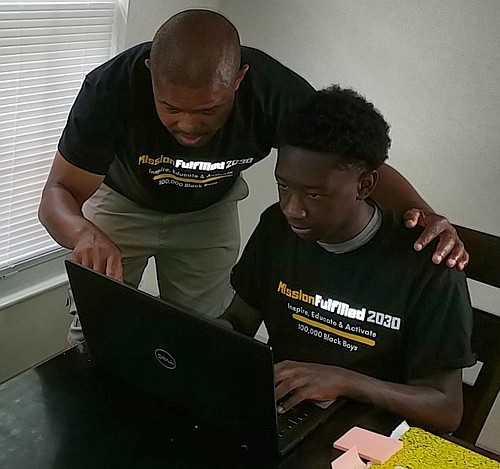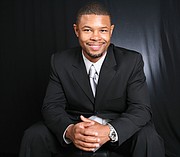Many educators and parents located in a wide array of school districts are scrambling to figure out how to maintain student achievement, while youth learn online from home beginning in September due to the ongoing COVID-19 pandemic.
Proactive parents have been searching for enrichment opportunities to help fill in learning gaps. One example of an established resource can be found in a STEM (Science, Technology, Education and Math) Education Advocate who is on a journey to empower Black boys.
Courtesy Photo
.
Gerald A. Moore, Sr. is the founder/CEO of the nonprofit, Mission Fulfilled 2030, which is committed to impacting 100,000 Black boys in a variety of technologies by 2030. This fall, the Norfolk State University alumnus will roll out an improved online platform, through The Gerald Moore Technology School for Black Boys where course offerings include: Coding; Web Design; App Development; Basic Electricity; Automotive Technology; Google Docs; and Technology Entrepreneurship. Examples of winter offerings include launching an IT (Information Technology) Fundamentals course, in partnership with CompTIA, which is the world’s leading technology association.
“[On] August 6, 2020, I resigned from my six-figure job (working as a cyber security engineer) to pursue my passion to work for the betterment of Black boys to rebuild the Black family. In order to bring into fruition the type of change I want to see for young Black males, I needed to truly embrace the vision of Mission Fulfilled 2030,” Moore said. “Considering that Black male representation in the Cyber Security field is really low, I needed to make an even bolder decision to leave something I love, for something I love more, and create that next generation pipeline of Black, male Cyber Security Engineers and IT (Information Technology) professionals.” The multi-talented Northern Virginia resident is also a father, newlywed and author of the Amazon best-selling book, “Motivate Black Boys – How to Prepare for Science, Technology, Engineering and Mathematics.”
The fee to enroll in The Gerald Moore Technology School for Black Boys is $29.99 per month. An introduction to computer science class is available to anyone free of charge.
When COVID-19 arrived, Moore decided to merge the technology school with the nonprofit and offer a free, online Computer Science Program for Black Boys. After three years of STEM mentoring, over 200 Black boys have participated in Moore’s school. The “socialpreneur” says there is nothing more rewarding than watching a boy’s eyes light up, when the student has a breakthrough in figuring something out, or a boy realizes that he can be successful.
Jordan Hennighan, 12, is one example of a student who has benefited fromMoore’s innovative approach to Black male mentoring.
“My favorite courses were ‘How Computers Work ‘ and ‘Basic Game Programming,’ because they allowed me to expand my knowledge, and gave me a different mindset on what I want to do when I get older. I also liked these two because they were very interesting and fun to learn about when we got to code and fix code,” Jordan said. “When I grow up I want to be able to code computers, build them and fix them. Also, I want to start my own coding business when I’m able to do that, to be able to make money and give computers to others that may not have a lot.”
Moore says that the Young Tech Entrepreneurs Course is a fan favorite. Boys ages eight to 17 are taught how to use free open source tools to conceptualize, design and build a working prototype. An Instagram style web/mobile app is one project example. Participants are also taught how to market, gain users and monetize it. Additionally, Moore wants to connect Black boys who are interested in STEM with 10,000 Black technology mentors. Professor Willie Sanders, Jr. is the founder and executive director of Baltimore-based Pass IT On who recently joined Moore to positively impact additional Black boys. Pass IT On’s similar mission is to help close the technology skills gap experience by youth and adults from disadvantaged backgrounds. Sanders and Moore realize that there is an urgent need to reach out to young, Black boys with a life-changing opportunity that gaining 21st century technical skill can provide.
“In D.C. and Baltimore, we lose too many of our young men of color to drugs and violence,” Sanders said. “We want these young boys to know there is a better way that can lead to a brighter future.”
To enroll Black boys in the online school or to learn more about it or to make a donation to Mission Fulfilled 2030, visit: http://www.gmtsbb.com/.

